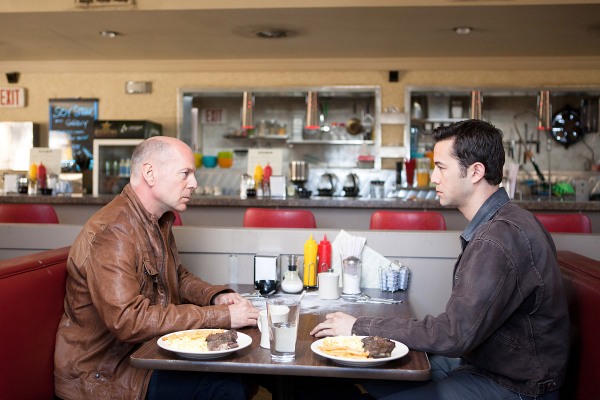Movie review by Greg Carlson
WARNING: The following review reveals plot information. Read only if you have seen “Looper.”
The best scene in writer-director Rian Johnson’s “Looper” frames the profiles of Joe (Joseph Gordon-Levitt) and Old Joe (Bruce Willis) in the booth of a small, mostly deserted diner. The two men are one and the same, and the face-to-face meeting knowingly flouts one of the longstanding paradoxes of time travel. The wheels of the plot insist that the Joes have incompatible tasks to accomplish, and even though the viewer hopes that the two appealing actors will spend significant screen time together, Johnson has other, equally ambitious ideas in mind for the second part of the movie.
That Joe would be at cross purposes with himself is one of Johnson’s smartest touches in a film bursting with promise. As a murder-for-hire trigger man carrying out dirty work for a future mobster who uses time travel to vacuum any trace of assassinations by having the killings done in an earlier decade, a “looper” like Joe belongs to the cinematic tradition of weary tough guys popularized in hardboiled detective noir. We are told (but can also certainly figure out) that these blunderbuss-wielding “gat men” are not a particularly optimistic class of outlaw. The very nature of their business insists on something Johnson calls “closing the loop,” which means pretty much what you think it does.
Johnson’s debut “Brick,” which also showcased the talents of Gordon-Levitt, remains the filmmaker’s strongest effort because it was less pedantic than “Looper” in its explorations of pain and loss. “Looper,” however, reaches for the cosmic territory of the very biggest questions of normative ethics, including the whopper conundrum that asks whether the murder of a particular child to spare the lives of many is a justifiable action. That wicked game dominates the last section of the film, and Johnson has it both ways by using Joe as the protector of the future killer known as the Rainmaker while Old Joe plots to pull the trigger on the little boy.
Johnson effectively constructs his own version of the so-called Hitler’s Murder Paradox, or at least the element of it in which we are asked whether a person should be held responsible for crimes that he or she has not yet committed. Sara (Emily Blunt), the maternal guardian of the child who may turn out to be the Rainmaker, believes that despite evidence to the contrary, the future is unwritten, and her point of view rejects predestination. To date, nobody has cinematically expressed the Hitler’s Murder Paradox and the unfathomable transformation from innocence to evil better than Elem Klimov in the apocalyptic masterpiece “Come and See.”
The resolution of “Looper,” a grand trope often described as the Heroic Suicide or Heroic Sacrifice, is Johnson’s answer to the problem. Despite being presented in the context of the film’s climax as a surprise, Joe’s death has been foretold and foreshadowed since the opening voiceover exposition, and will shock only those who were not paying much attention. Or those who have never seen “Alien 3,” “Terminator 2: Judgment Day,” “Constantine,” “Gran Torino,” “Sunshine,” “Dancer in the Dark,” “Armageddon,” and “Sin City,” the latter two of which (perhaps coincidentally) afford Bruce Willis the opportunity to do himself in for a good reason.
